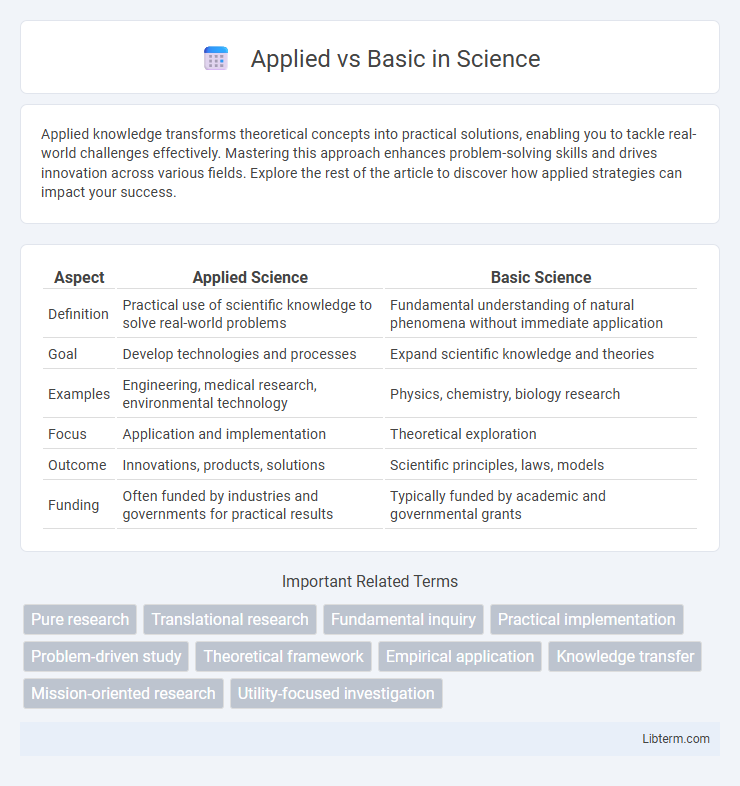Applied knowledge transforms theoretical concepts into practical solutions, enabling you to tackle real-world challenges effectively. Mastering this approach enhances problem-solving skills and drives innovation across various fields. Explore the rest of the article to discover how applied strategies can impact your success.
Table of Comparison
| Aspect | Applied Science | Basic Science |
|---|---|---|
| Definition | Practical use of scientific knowledge to solve real-world problems | Fundamental understanding of natural phenomena without immediate application |
| Goal | Develop technologies and processes | Expand scientific knowledge and theories |
| Examples | Engineering, medical research, environmental technology | Physics, chemistry, biology research |
| Focus | Application and implementation | Theoretical exploration |
| Outcome | Innovations, products, solutions | Scientific principles, laws, models |
| Funding | Often funded by industries and governments for practical results | Typically funded by academic and governmental grants |
Introduction to Applied vs Basic Research
Applied research focuses on solving practical problems by using scientific methods to develop new technologies or improve processes, whereas basic research aims to expand fundamental knowledge without immediate application. Applied research often involves hypothesis-driven experiments targeting specific outcomes, while basic research explores theories and principles to understand underlying phenomena. Both types of research are essential for innovation, with basic research providing the foundational insights that applied research translates into real-world solutions.
Definition of Basic Research
Basic research refers to systematic investigation aimed at acquiring new knowledge without immediate practical application. It focuses on understanding fundamental principles and underlying mechanisms across various scientific disciplines, such as biology, physics, and psychology. This type of research forms the foundational base for future applied studies and technological advancements.
Definition of Applied Research
Applied research is a systematic investigation aimed at solving practical problems by applying scientific knowledge to real-world issues, focusing on immediate applications rather than theoretical understanding. It seeks to develop innovative technologies, processes, or products to address specific challenges in industries such as healthcare, engineering, and education. Unlike basic research, which expands foundational knowledge without direct applications, applied research prioritizes actionable outcomes and measurable impact.
Key Differences Between Basic and Applied Research
Basic research seeks to expand fundamental knowledge without immediate practical application, focusing on theoretical understanding and exploratory inquiries. Applied research targets specific, practical problems, aiming to develop solutions or innovations based on existing theories. The key difference lies in their objectives: basic research prioritizes knowledge generation, while applied research emphasizes real-world implementation and problem-solving.
Purpose and Scope
Applied research aims to solve practical problems by developing specific solutions and technologies, targeting immediate applications in industries, healthcare, or policy. Basic research focuses on expanding fundamental knowledge without immediate commercial objectives, exploring theoretical frameworks and underlying principles across various scientific fields. The scope of applied research is narrow and goal-oriented, while basic research is broad, seeking to advance general understanding.
Methodologies Used
Applied research employs practical methodologies such as experiments, surveys, and case studies to address real-world problems and create immediate solutions. Basic research relies on theoretical frameworks, controlled laboratory settings, and longitudinal studies to advance fundamental knowledge without direct application. Both methodologies emphasize systematic data collection and rigorous analysis but differ in their focus on practical outcomes versus conceptual understanding.
Examples of Basic Research
Basic research explores fundamental principles without immediate commercial objectives, exemplified by studies on the atomic structure of materials or the genetic code of organisms. Investigations into the properties of electrons or the human genome map exemplify this type of research, aiming to expand scientific understanding. These foundational insights often serve as a precursor to applied research that develops practical technologies or treatments.
Examples of Applied Research
Applied research focuses on solving practical problems using scientific methods, such as developing new medical treatments, improving agricultural techniques, or designing energy-efficient technologies. Examples include creating vaccines for emerging diseases, optimizing supply chain logistics in manufacturing, and enhancing software algorithms for better data security. This research directly impacts industries and society by addressing specific challenges with targeted solutions.
Advantages and Limitations
Applied research drives practical solutions by addressing specific problems, enabling immediate technological advancements and policy improvements. It often has clear objectives and measurable outcomes but may lack the broad theoretical scope, limiting its contribution to general knowledge. Basic research explores fundamental principles without immediate application, fostering innovation and long-term benefits, though it often requires extensive time and resources before practical results emerge.
Choosing the Right Approach
Choosing the right research approach hinges on the intended outcome: applied research targets specific practical problems to generate actionable solutions, while basic research seeks to expand foundational knowledge without immediate application. Professionals must assess their goals, resources, and the impact timeframe to determine whether applied or basic research aligns best with their objectives. Understanding the distinctions in methodology, scope, and purpose ensures strategic investment in research efforts that drive innovation or deepen scientific understanding.
Applied Infographic

 libterm.com
libterm.com